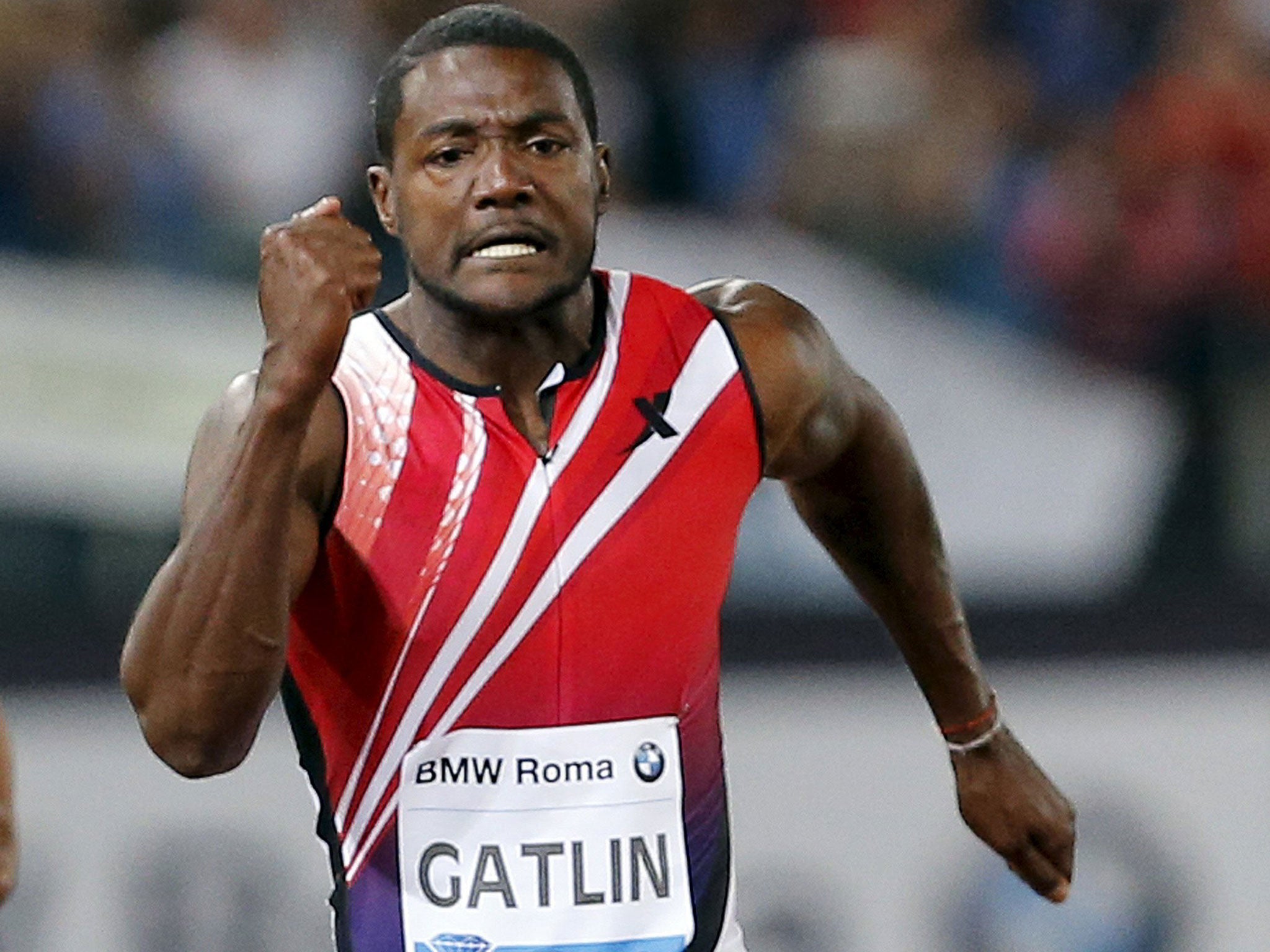Athletics World Championships 2015: Press attacked for revealing fears of another global con
Justin Gatlin says his six year ban from the sport has left him with a 'physical age' of 27

We are about to witness the spectacle which has delivered us to the edge of our seats so often and, for pure quality of athleticism, so often eclipsed the Olympics. Michael Johnson’s golden 400-metre lap of the Seville track in 1999, Mike Powell’s leap into history in Tokyo eight years earlier, Tiina Lillak’s almighty javelin throw which did for Fatima Whitbread right back in ’83, and – perhaps eclipsing the lot for most of us – Jessica Ennis, leading the heptathlon from start to finish in Berlin six years ago.
Precious moments, all of them, which belong to a time before the credibility of athletics was shattered in a way which now ascribes Beijing a resounding hollowness. We know – because of disclosures wrung out of the International Association of Athletics Federations – that at least 28 competitors from the 2005 and 2007 World Championships doped. We have been reminded in the past week that 30 per cent of athletes may have cheated at Daegu in 2011. And we wonder how many more stones are yet to be turned over.
The Sunday Times has disclosed that 12,000 samples from 5,000 athletes have cast a shadow over a third of medals in endurance events at the Olympics and World Championships between 2001 and 2012. If there has ever been a multidiscipline event more painfully lacking in credibility than this one, then it has been hiding in the woods.
There is no more acute a sense of an IAAF con trick than the men’s sprints in Beijing. Everyone bar the Americans seems to fear a flourish by Justin Gatlin, brought back on to the national and Nike roster despite testing positive twice, for amphetamines and testosterone. Gatlin – who has been tested 59 times since his return to competition – is aged 33, and yet running faster than he was when winning the Olympic and world sprint titles in 2004 and 2005. He says this is because six years banned from the sport have left him with a “physical age” of 27. I am still searching for a passage in the science books which bears out this notion.
Tyson Gay tested positive for a banned steroid in 2013. (A potential two-year ban was reduced to a year for the help Gay provided to anti-doping authorities.) Asafa Powell was banned for taking the stimulant oxilofrine. And then there is Dennis Mitchell, personal coach to Gatlin and the US relay teams, who failed a test for testosterone in 1998. Mitchell said the false positive was caused by his having had sex five times the night before the test. That one’s hard to locate in the science manuals, too.
So these are the men you are watching, folks, along with others coached, of course, by Alberto Salazar of the Nike Oregon Project, currently subject to an ongoing United States Anti-Doping Agency investigation. Your heart might not sink quite so much at the roll call if those investigative journalists who have uncovered so much did not find themselves so perpetually maligned by the establishment. UK Athletics’ chairman, Ed Warner, was at it again on the BBC’s Today programme on Wednesday; while defending Lord Coe saying that The Sunday Times had “declared war on athletics”, he added: “I don’t believe the British press has completely covered itself in glory on the doping issue in recent weeks because there has been some lazy, shorthand journalism at times.”
And what, precisely, would you be describing, Mr Warner? The Daily Mail’s entirely justifiable decision to report that shortly before the London Olympics Mo Farah failed to answer the door to drug testers instructed to ring his doorbell repeatedly over the course of an hour? And to make available the video made by his agent in an attempt to prove Farah could not hear the bell?
Warner and his like would be better served by abandoning the characterisation of investigative journalists as the enemy. To acknowledge The Sunday Times’ valuable work, rather than describe it as a “fair challenge”, as Warner so dismally put it. He might care to look, instead, at the way Salazar, Farah’s coach and the man on Team GB’s payroll, has undertaken a visceral attack on whistle-blowers, such as the University of Houston’s Steve Magness.
Hajo Seppelt, the German journalist who has also added so much to the sum of our understanding, told The Guardian this week that he had received only three letters from the IAAF over the past nine months: those threatening him with legal action and those asking what he was going to say at forthcoming international anti-doping conferences.
Lord Coe, the new IAAF president, has promised action and we wait to see if words translate to action because they require a further strike against his sport’s credibility. In the meantime, there are eight days of athletics ahead. We must suspend some of our deepest suspicions as we watch.
Subscribe to Independent Premium to bookmark this article
Want to bookmark your favourite articles and stories to read or reference later? Start your Independent Premium subscription today.

Join our commenting forum
Join thought-provoking conversations, follow other Independent readers and see their replies